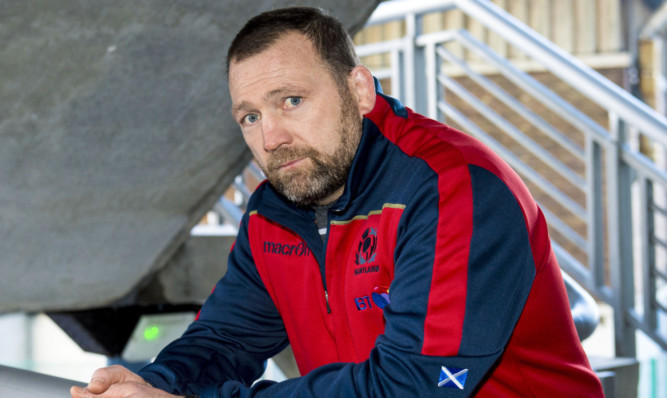Saturday’s Calcutta Cup game “could have easily gone either way” and was not easy for the English, insisted Scotland assistant coach Jonathan Humphreys.
Scotland need to look to this week’s second opponents in the RBS 6 Nations for inspiration on how to come through in tight situation in big games, believes Humphreys, who underlined how close the Scottish camp felt they came to beating the English.
“We were in the game all the way through and the other times I’ve been involved in games against England you couldn’t say that,” said the forwards specialist. “We created opportunities and got inside their 22 eight times, but the frustrating fact is that we came away with no points and got a little sloppy at crucial times.”
Having a four-man attacking lineout with just six minutes remaining and only six points behind could have been such a point, he added, the Scots losing a knock-on and never getting a look at the ball for the final moments.
The idea that England had it easy, however, as their coach Eddie Jones suggested, was thoroughly rejected.
“I don’t think they did. Certainly speaking to players and coaches after they didn’t think so,” he added. “I think the game was there to be won for both sides.”
Saturday’s hosts Wales meanwhile came back from a parlous situation in Dublin at 13-0 down to have the better of a 16-16 draw, and Humphreys reckons their experience and knowledge of each other is the key.
“International rugby is hugely pressurised, it is determined by four or five key moments in every game. It is about understanding when these key moments are and how to react to that.
“We have a pretty inexperienced team and we are trying to work through that and make sure we get to where we need to.”
The “inexperienced” Scotland team actually had more caps per head than England on Saturday, but the highly pressurised moments are what Humphreys was referring specifically to.
“Teams that have been there, done it and squeezed out those moments in a game, they have that experience,” he continued. “We are trying to do that, trying to be a team that squeezes out moments. We are a little frustrated with that but we are going forward and improving.”
Wales are what Scotland aspire to, but there’s a bit of “catch-up” to do, he admitted.
“I think they’re pretty resourceful in terms of coming out of tricky situations, they’ve done it many, many times,” he continued.
“That team has been together an incredibly long time. We are trying to play a bit of catch-up in that respect.
“What we can do is work on the small details without getting too emotional about the outcome. We are trying to be fixed on the process.
“It’s better that we concentrate on ourselves and work on the things that we feel are stopping us getting over the line in these close games.
“We will tweak a few things, but we have two days of training and Wales probably have just one and a half, so nothing much will change. Rather than concentrating on what they think and feel, it is important that we work on ourselves.”
Scotland haven’t won in Cardiff since 2002, which was only their second visit to the Millennium (now Principality) Stadium, and the last time was a 50-point nightmare for the Scots.
“It was one of those games you hope you don’t go through too many in your life,” he said. “It was pretty bad.
“It felt a little bit like the Samoa game; when they had the ball you just felt it would go to score. They were throwing the ball everywhere, it was sticking and they were running riot.
“But looking at us now compared to where we were then, I think we are significantly further down the line. It’s difficult to show that when you don’t get across those lines in really close games, but as a group we do feel we are improving and we are ready to take that next step.
“It’s just a tiny step but it takes a lot to get over it.”
